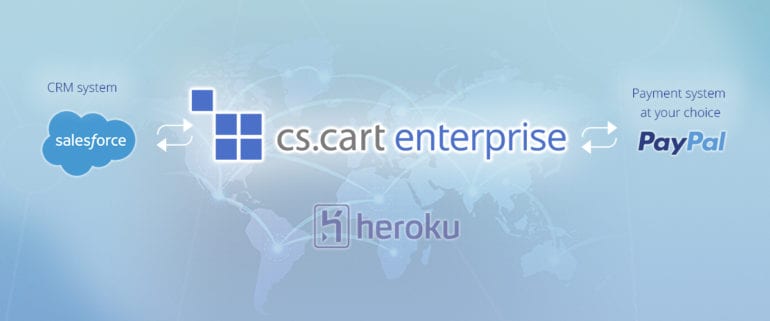CS-Cart Enterprise: Brand New or the Next in Line?


|
Stacy (Anastasia Raspopina) joined CS-Cart team in 2017 to run marketing activities for CS-Cart Enterprise, cloud eCommerce platform built on Salesforce’s Heroku infrastructure. Previously she worked at Percona as a Marketing Specialist responsible for internal company communications, event management, promotional activities, content generation and other special projects. |
Several weeks ago our team shared a lot of stunning feedback for CS-Cart & Multi-Vendor, and now we are glad to officially introduce CS-Cart Enterprise, the newest addition to our product line. What is CS-Cart Enterprise? What unique features it provides out-of-the-box? How is it integrated with Salesforce, the world’s #1 CRM solution? Find the answers in the blog post below.
We created this product to fill the existing gap on the market of enterprise-ready eCommerce solutions integrated with Salesforce. There are high-quality solutions for large corporations, however, when it comes to midsize businesses, the landscape doesn’t look so bright—there’s a need in an affordable ecommerce platform for Salesforce users. This is where we stepped in, and CS-Cart Enterprise was first introduced to Salesforce community at Innovating CX Prague. The product was very well received, and its first users were kind enough to review it on Capterra.
Let me share with you the core technical highlights that our product has prepared for the community of current and prospective Salesforce users.
- CS-Cart Enterprise is a cloud ecommerce solution based on the CS-Cart software core. The usage of a cloud platform makes possible short time to market. CS-Cart Enterprise comes with 500+ ecommerce features, partly inherited from CS-Cart.
- Thanks to a set of well-documented APIs, CS-Cart Enterprise can easily be connected to external ERP suites, PIM software, OMS solutions, POS systems or marketing automation tools.
- Heroku Connect is the trusted solution behind data synchronization. Hybrid synchronization via both Heroku Connect and Salesforce API is also an option.
- CS-Cart Enterprise provides automatic two-way data synchronization between CS-Cart Enterprise and Salesforce (data on products, prices, orders, customers goes from Salesforce to CS-Cart Enterprise and vice versa).
So what is the difference between CS-Cart Enterprise and CS-Cart?
#1. CS-Cart Enterprise is delivered through the cloud, which means that it uses Heroku hosting and database solutions. CS-Cart is a downloadable shopping cart software, which means that you choose a hosting, and maintain the technical part of your store yourself. You fully control your web store, but you are also fully responsible for its trouble-free performance.
#2. The two products have different pricing models. Unlike CS-Cart, CS-Cart Enterprise is a cloud ecommerce platform for corporations paid for on a monthly basis. For large companies, caring for compliance, high availability and risk reduction, a cloud solution is often a good fit. CS-Cart Enterprise runs in Salesforce’s own trusted, fast and secure Heroku infrastructure maintained and supported by word-class IT professionals. The 30-day payment covers hosting, database and support credits in accordance with the customer’s pricing plan.
#3. CS-Cart Enterprise is integrated with Salesforce Sales Cloud out-of-the-box. This means that data in both systems are synchronized, so you will be able to recognize your customer coming either from your offline or online store. The business owner gets better business manageability. No external Salesforce connectors are needed for the default synchronization, which also means lower costs.
So, what you people think about this new product? Share in the comments! And don’t forget to subscribe to the CS-Cart Facebook and Twitter pages.
Yan Anderson is the Head of Content Marketing at CS-Cart with over 10 years of experience in the eCommerce industry. He's passionate about explaining complicated things in simple terms. Yan has expertise in building, running and growing eCommerce marketplaces. He loves to educate people about best practices, new technologies, and trends in the global eCommerce industry.
